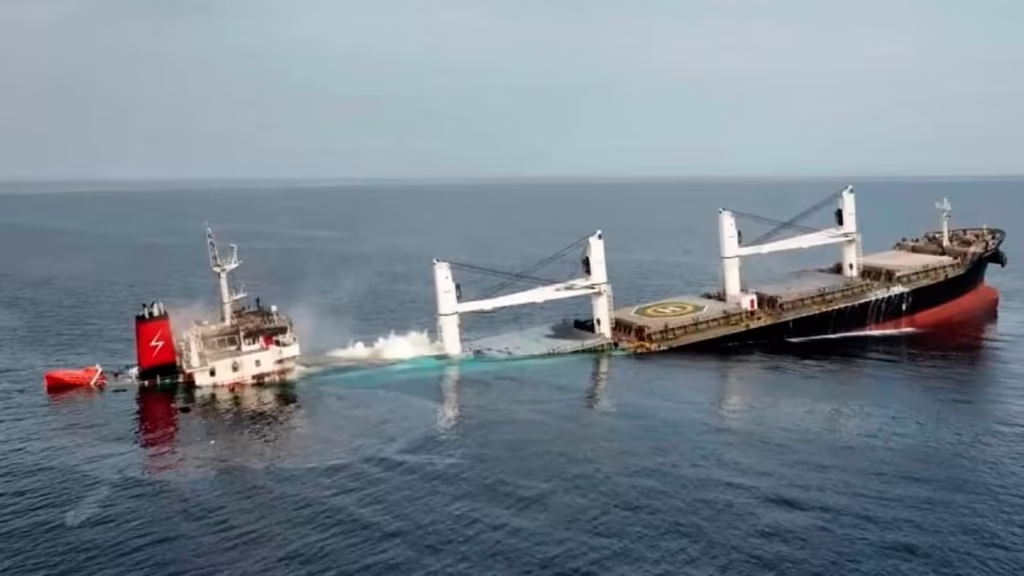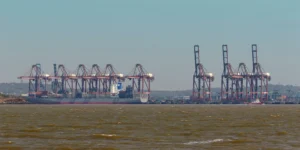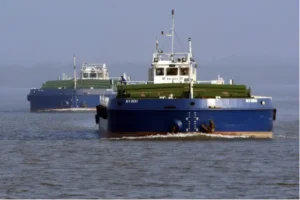Yemen’s Houthi militants have significantly escalated their maritime operations in the Red Sea and surrounding seas. In a recent public statement, the Houthis disclosed they are actively tracking commercial shipping routes between Israel, Egypt, and Turkey—using AIS data to monitor vessels that may call on Israeli ports. They specifically named major shipping lines, including Maersk and MSC, as being within their scrutiny.
This tracking disclosure accompanies a major policy shift: the Houthis have declared they will target any merchant ship belonging to companies that do business with Israeli ports, regardless of the vessel’s nationality. This marks the onset of a new “fourth phase” of their naval campaign, aiming to impose a de facto blockade in defense of Gaza.
Fatal Attacks Raise Red Sea Risk
The heightened threat environment turned lethal in early July 2025 with two dramatic attacks. The Liberian-flagged bulk carrier Eternity C was struck by sea drones, rocket-propelled grenades, and unmanned surface vessels, resulting in its sinking, four confirmed deaths, and many crew members kidnapped—several shown in a released propaganda video. In a separate incident, the Magic Seas, also Liberia-flagged and Greek-owned, was attacked and sunk, although its crew were rescued.
These incidents mark the first fatalities from Houthi operations since June 2024, underscoring the escalating maritime violence and mounting red sea risk for global shipping.

Tracking Ships & Broader Intent
The Houthis’ acknowledgment that they’re «tracking shipping routes» reveals an effort to systematically identify vessels linked to Israel via calls to Turkish or Egyptian ports en route to Israeli destinations. Their targets now include all carriers whose parent companies have any involvement with Israeli ports like Haifa—even if a specific ship does not directly sail there.
According to analysts, this shift represents a strategic “sea change,” broadening the scope of threat and compelling shipping companies to rethink their risk exposure.
Impact on Shipping and Global Trade
The intensifying Red Sea risk is prompting insurers and shipping firms to reroute vessels. Many carriers are avoiding traditional routes through Bab el‑Mandeb and the Suez Canal, opting instead for the longer and more expensive journey around the Cape of Good Hope. This has increased shipping times, insurance costs, and operational complexity.
In early 2024, more than 2,000 vessels diverted from the Red Sea, causing a measurable drop in global trade volumes. Over 50% of dry bulk and nearly half of oil tankers now sail around Africa to avoid the danger zone.
Military Responses and Diplomatic Fallout
In response, the U.S. and a multinational coalition launched Operation Prosperity Guardian in December 2023 to escort shipping through the Red Sea and Gulf of Aden. Although limited ceasefire agreements briefly reduced attacks, the Houthis have maintained that Israel-linked ships remain valid targets, irrespective of international pressure.
Israel has retaliated with airstrikes on Houthi-controlled ports and infrastructure in Yemen, alleging the attacks were used to transfer Iranian weapons and conduct maritime surveillance. The strikes followed the sinking of Magic Seas and Eternity C and were described as part of a broader security escalation.
Also Read: Evergreen’s Ever Lunar Loses – 50 Containers Overboard off Callao Bay
Outlook: Maritime Security in Jeopardy
Experts warn that shipping companies face an uncertain future. Although there are diplomatic overtures and discussions with the U.S., the Houthis’ stated intent to expand targeting criteria means that even neutral vessels linked to Israeli-associated carriers now face risk. Shipping firms like Hapag‑Lloyd, ONE, Yang Ming, and CMA CGM are all explicitly in the crosshairs, regardless of vessel nationality or route.
Until a durable ceasefire or diplomatic resolution emerges in the Israel‑Gaza conflict, including guaranteed protection for transit, Red Sea risk remains elevated. Maritime security analysts suggest that the threat could expand unpredictably, requiring heightened vigilance and possibly naval escorts for safe passage.
Source: (gcaptain,maritime-executive)




